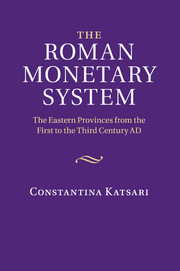Book contents
- Frontmatter
- Contents
- List of charts
- Acknowledgements
- List of abbreviations
- Framing the Roman Monetary System: An Introduction
- 1 Statistics and numismatics
- 2 Planning the financial policy of the Roman state
- 3 Trimetallism and bimetallic laws
- 4 The application of the Quantity Theory of Money to third-century economics
- 5 Roman monetary integration
- 6 Micro-economies
- 7 Metallism vs. chartalism
- Appendix 1 The inscription of Mylasa
- Appendix 2 Excavations finds, coin hoards and museums
- References
- Index
1 - Statistics and numismatics
Published online by Cambridge University Press: 01 March 2011
- Frontmatter
- Contents
- List of charts
- Acknowledgements
- List of abbreviations
- Framing the Roman Monetary System: An Introduction
- 1 Statistics and numismatics
- 2 Planning the financial policy of the Roman state
- 3 Trimetallism and bimetallic laws
- 4 The application of the Quantity Theory of Money to third-century economics
- 5 Roman monetary integration
- 6 Micro-economies
- 7 Metallism vs. chartalism
- Appendix 1 The inscription of Mylasa
- Appendix 2 Excavations finds, coin hoards and museums
- References
- Index
Summary
Over the last few decades a lot of ink has been spent in order to decide what is the most efficient way to study ancient coins. In particular, several articles were dedicated to answering the following question: should we or should we not use statistics in the analysis of ancient material? Since statistical analysis is fundamental in economics, a response to this problem may change basic perceptions with regard to the study of the discipline. However, scholarly views range from the nihilistic approach that denies all value to statistics to the opposite side that promotes the use of advanced mathematical formulas. Such polarisation seems to be counterproductive and it inhibits rather than facilitates the reconstruction of the ancient economy. Instead, a combination of the opposing positions may give us some tangible results and at the same time further our knowledge on the subject. In my study I employ simple statistical practices, which could assist in the economic analysis of Roman coins, while I still believe strongly in the qualification of the available data. In this chapter I intend to reveal in more detail the methodology I followed throughout the entire book: a methodology based on the experience of several numismatists who have studied coins since the beginning of the twentieth century. In addition, I will attempt to explain the problems arising from the study of the ancient monetary economies as well as the possible solutions.
- Type
- Chapter
- Information
- The Roman Monetary SystemThe Eastern Provinces from the First to the Third Century AD, pp. 9 - 33Publisher: Cambridge University PressPrint publication year: 2011



